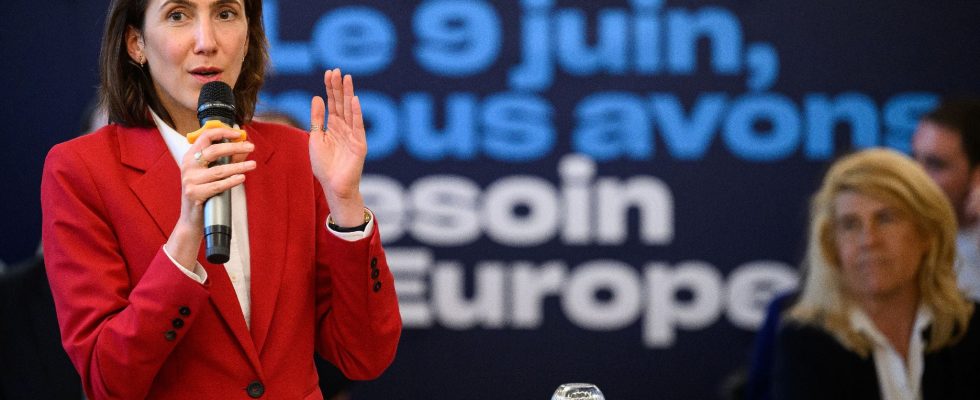Investing 100 billion euros for defense, a “Europe 2030 Plan” of 1,000 billion euros of public and private funds, the defense of “European values” with a “numerical majority at 15 years”… The presidential majority has presented, Monday May 6, its program for the European elections, almost a month before the election.
Campaign poster with the Head of State in the background, head of the list Valérie Hayer and campaign spokespersons Nathalie Loiseau, Marie-Pierre Védrenne and Clément Beaune declined the 48 proposals in the program on Monday morning.
The presidential camp, left behind in the polls by Jordan Bardella’s RN and closely followed by Raphaël Glucksmann’s PS-Place Publique list, intends to set in motion a new dynamic, with the “national meeting” organized Tuesday at the Palais de la Mutualité in Paris, in presence of Gabriel Attal.
After the first thirty names announced on Friday, were added on Monday, at the end of the list, the three party leaders of the majority, Edouard Philippe (Horizons), François Bayrou (MoDem) and Stéphane Séjourné (Renaissance), as well as the Former Prime Minister Elisabeth Borne.
“It is an ambitious program so that Europe does not die”, bringing together the “conditions to create a powerful Europe tomorrow”, argued head of the list Valérie Hayer. Formulas that strongly resonate with President Emmanuel Macron’s speech on April 25 at the Sorbonne.
These proposals “are the best to fight against the three risks that face us: the security and migration risk, the climate and economic risk” and “the democratic risk and attack on our values”, she declined. First axis addressed: Defense. The majority advocates in particular investing 100 billion euros at European level and wants to see the budget of each State increased to 2% of GDP by 2025 and 3% by 2030.
“We are asking the European Investment Bank to come and work on the defense sectors” and “we are in favor of borrowing on these 100 billion euros,” said MEP Nathalie Loiseau (Horizons).
On the economic, social and environmental aspects, the French presidential majority wants a “Europe 2030 Plan” of 1,000 billion euros, with public and private funds, to “complete the Green Deal” adopted during the last legislature.
“European trade shield”
This plan must cover five sectors: energy, transport, digital, health, space. These public funds will have to rely in particular on a common long-term loan, repaid by new resources, it is specified in the program. Among the objectives, the production of 10 million clean vehicles in Europe, a European green plane.
In the field of health, the Macronists want a “Marie-Curie Plan” for European vaccines and treatments against cancer, degenerative diseases and research on autism.
To “illustrate” this priority, Valérie Hayer visited in the afternoon the Gustave-Roussy center in Villejuif (Val-de-Marne), “French and even European excellence in the treatment and research against cancer”.
A visit where there was a lot of talk about “regulatory constraints”. “We see that particularly in Europe and in France, we have an administrative burden which creates obstacles for the development of research and attractiveness”, “we must be able to accelerate, also free up, for the benefit of innovation “, she declared at the end.
The Macronists also want to extend the carbon tax at the borders to new sectors, such as automobiles, or even cement and imported steel from 2026. They want to “impose a European trade shield”, with automatic customs duties and massive in response to any customs tariffs against European companies and “mirror rules” for imports.
Third main component: European democratic “values”, with the desire to include access to abortion in the European Charter of Fundamental Rights, or even the ban on extra-European financing in favor of political parties. The program does not mention enlargement. “We are not hostile to enlargement in principle, unlike others” but “there are stages, conditions, negotiation deadlines, we are not talking about enlargement for tomorrow morning”, clarified Clément Beaune who cited Ukraine and Moldova.
